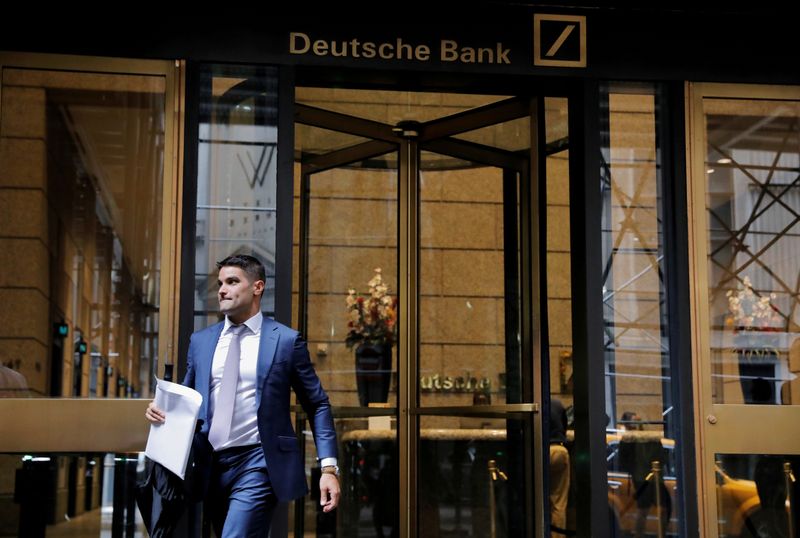By Tom Sims
FRANKFURT (Reuters) - Deutsche Bank (ETR:DBKGn)'s new retail boss wants to get cyber-savvy youth into bank branches and put the bank at the heart of communities, a bold vision in an industry struggling to balance technology with a brick-and-mortar presence.
For years, banks in Europe, including Deutsche, have been slashing branch networks to save costs and take advantage of technology like smartphones, while some competitors have sprung up with online-only offerings.
Claudio de Sanctis, who will on July 1 take over Deutsche Bank's giant retail business, said European banks need a "different concept" for their branches, which have become "not that exciting" as mere transaction-based spaces.
A philosopher by education with years of banking for the rich under his belt, de Sanctis wants to see retail branches become a focal point of communities - like churches - larger, more welcoming and "a place where people who have the time and the interest can go", he said in an interview last month.
"If you were to go to a university today and tell a bunch of students, 'Guys, you want to hang around in the bank branch?', they would look at you like you're crazy. That makes me very excited about trying to do that because I love that kind of challenge," he said.
The Italian and Swiss dual citizen will assume the helm of one of Deutsche's biggest businesses months earlier than the November date initially planned, the bank announced on Tuesday, a promotion to oversee a division that brings in a third of the bank's revenue and employs more than four of every 10 staff.
"Banks have lost the role they played in society over the last 20 to 30 years. When I was a kid, the advisors of the family were the priest, the doctor and the bank," de Sanctis said.
"Today, our economic purpose is still there, but we are no longer that sort of central aggregator. And I believe that that's very much needed in Europe."
He was, however, short on specifics on how to achieve his vision ahead of officially taking the job, succeeding Karl von Rohr who said in April he would be leaving the bank.
'CLEAR RESPONSIBILITIES'
Other banks have dabbled in spicing up their branches. The Spanish bank Santander (BME:SAN) has set up so-called work cafes that combine branches with coffee houses.
Deutsche has pared its retail network by more than 300 branches over the past five years to around 1,000 today.
The bank is expected to continue to trim branches as it seeks further ways to curb expenses, a person with knowledge of the matter said. S&P, which last month upgraded its outlook for the bank, said that the retail division has "considerable scope" to cut costs.
De Sanctis' ascension is part of Deutsche's biggest management shake-up since 2019.
Its supervisory board in recent days agreed for him to assume the role next month in a move the bank described as creating "clear responsibilities at an early stage".
Deutsche Bank's retail business encompasses wealth management in far-flung financial capitals - with clients that have included Donald Trump and the late financier Jeffrey Epstein. It also operates retail branches in Italy and Spain, with a focus on entrepreneurs.
But the bulk of its millions of customers are in Germany, where Deutsche also operates under the Postbank brand.
In recent years, retail - which Deutsche calls its "private bank" - has lagged the investment bank in revenue growth, and it has been dogged by technology integration issues it hopes to overcome soon.
Deutsche's retail outlets have also been among targets of Dutch gangs that cross the border and blow up German ATMs for their cash.
Higher interest rates by central banks to fight inflation are now lifting the fortunes of the division.
De Sanctis joined Deutsche Bank in Switzerland in 2018 after years as a wealth manager for Credit Suisse (SIX:CSGN), UBS and Barclays (LON:BARC). He has most recently been overseeing Deutsche's wealth management and international retail operations.
He challenged the notion that banks have evolved because they went digital.

"There has been very, very little revolutionary development of the retail space in the last 20 years in Europe," he said.
The sector is "primed for a proper shake-up".